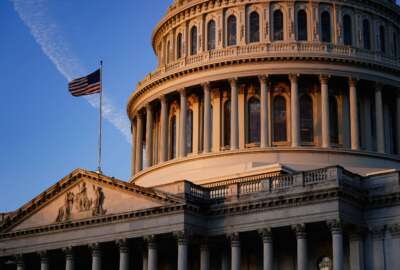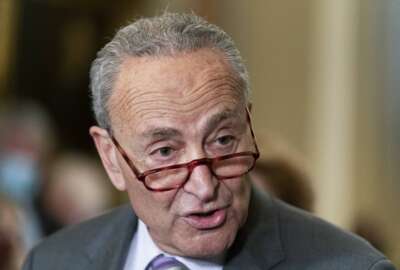How Congress can deal with bipartisan voter concern about corruption
A survey sponsored by the Project on Government Oversight finds voters across the spectrum suspect there's corruption in the government. With a view of what...
Best listening experience is on Chrome, Firefox or Safari. Subscribe to Federal Drive’s daily audio interviews on Apple Podcasts or PodcastOne.
Stop us if you’ve heard this before. But in a politically divided America, trust in government is at a low point. A survey sponsored by the Project on Government Oversight finds voters across the spectrum suspect there’s corruption in the government. With a view of what Congress can do about it, POGO’s government affairs manager, Dylan Hedtler Gaudette, joined Federal Drive with Tom Temin.
Interview transcript:
Tom Temin: Mr. Gaudette, good to have you back.
Dylan Hedtler-Gaudette: Hey, Tom, thank you so much for having me.
Tom Temin: First of all, tell us about the survey. What was it designed to do and what did it discover?
Dylan Hedtler-Gaudette: We commissioned a survey in Michigan and Ohio, I’m sure people have heard a lot about those two states, we hear a lot about them every four years or so. They are important from the electoral standpoint. And they’re also important because they are extremely narrowly divided. And they are kind of a good microcosm of the rest of the country. So we commissioned some polling there in those two states to really get a sense of what voters think about corruption, how they perceive it, as far as their priorities go, kind of like where they rank corruption. And it turns out across the political spectrum, no matter how you identify in terms of partisanship, you think as a voter in Michigan or Ohio that corruption is a huge problem, that it’s getting worse, and that Congress really needs to do something about it.
Tom Temin: And then there are some issues that come to light from time to time, and Congress itself on the shady dealings front.
Dylan Hedtler-Gaudette: Absolutely. Unfortunately, these things tend to crop up like clockwork. We will hear things about a member of Congress or perhaps a spouse of a member of Congress engaging in a stock trade that looks pretty suspicious based on some potentially non-public information. So maybe there’s some insider trading there. Sometimes a member of Congress is under suspicion because of something they’ve done in the campaign finance space, they’ve received some campaign money that perhaps they should not have from a source that they should not have, or they’re not reporting thing they’re supposed to be reporting around campaign finance. Sometimes we see a member of Congress using campaign funds in ways they shouldn’t. Sometimes they will do that through paying for their club dues. Sometimes they will do it to acquire their own campaign materials and books. And those are all things that campaign funds should not be used for. And they represent ethical lapses. And they really just reinforce the public’s perception that all of Congress and all of government and all of politics is corrupt. And it’s all just really shady, which is a problem that we should all be concerned with.
Tom Temin: Yes, because the federal government is not above having ethical lapses as individuals of a organization with 2 million people, you’re not going to get everybody perfect all the time. But in general, the perception in the federal procurement area is that has been largely free of corruption over the decades. Is the survey showing and is there the sense in the public that maybe that’s not the case, that federal agencies themselves harbor people who indulge in corruption?
Dylan Hedtler-Gaudette: I think that’s right, yeah. I think we do a lot of work in the procurement and acquisition space too, and we do see that there are issues being around the revolving doors, but cozy relationship between contractors and people in government, and then people switching between those kinds of positions, there can definitely be opportunities for corruption there. And I think one point to draw out a bit is that even if there isn’t specific actual corruption that happened in a specific case, the other perception of corruption is oftentimes just as bad as the actual thing because it feeds into the feedback loop where the public doesn’t trust the government. And they continue to not trust the government every time something like this crops up, so there can be just as bad of a downside effect when we’re talking about the appearance of impropriety as opposed to actual impropriety.
Tom Temin: We’re speaking with Dylan Hedtler Gaudette, government affairs manager at the Project on Government Oversight. And so what can Congress do about this? What are some of your high end recommendations?
Dylan Hedtler-Gaudette: Well, one thing that we keep pushing for is for Congress to start with itself. There are, as we mentioned earlier, quite a few areas in which Congress has its own ethical problems. And well, there are ethical issues that need reform and need policy interventions across the government, including in the executive branch and in the judiciary. I think it would be a little bit of an easier, at least initial step for Congress to start by cleaning up its own house. So I think enacting some reforms around what kind of financial assets you are able to own if you are a member of Congress. And that oftentimes means stocks. I think it’s pretty clear at this point that you should just not be able to own and trade stocks, while you’re a member of Congress, there are just all kinds of issues that continue to pop up around that specific thing. And I think if you are on specific committees and you have a financial interest that is related to the industry, or companies that are overseen and impacted by the work of that committee, I think there needs to be some strong rules around what activities you’re able to participate in as a member of Congress in that space and what activities you are not able to participate in. And I think trying to clear away some of those conflicts of interests are important, trying to do something around ways in which members of Congress will seek some kind of income outside of their congressional salary. I think we need to take a hard look at those kinds of things. I think campaign finance reform is important. I think having some stronger rules around what campaign funds can be used for and what they cannot be used for and what the consequences are for violations of those rules is really important. So those are just a few things specifically that Congress can do. And I think as I said earlier, starting with their own house, and then trying to use that as a proof of concept to move on to the executive branch and to the judiciary, I think is the common sense approach here.
Tom Temin: And just as a practical matter, there are people that come into Congress, elected into Congress, and there are people that join the executive branch, who come with wealth, have come with a lifetime of great investing or great company building. What are some practical approaches to people that are wealthy, but nevertheless, want to honorably serve?
Dylan Hedtler-Gaudette: Oh, I think you’re hitting on something important there, Tom. Because once you become a member of the government, and once taxpayers are paying your salary, be that as an executive branch official, or as a federal judge, or as a member of Congress, you have to do a bunch of things that you wouldn’t have to do if you were a private citizen, and that part of the social contract between you and the public. And I don’t think it’s unreasonable to expect some of those things like transparency around your financial assets, perhaps you have to make a sacrifice, like in terms of your ability to make money while you’re in office. And I don’t think that is unreasonable. And I don’t think most voters would think that was unreasonable, either. So if you are tremendously wealthy, and you’re coming into government, I don’t think anyone is saying you have to stop being wealthy, I think we would just say you can’t continue to make money while you’re in office, because your primary concern should be the public interest. And it shouldn’t be your own financial interest. And if that is too much of a burden for you, then you don’t have to run for Congress, or you don’t have to accept an appointment to the executive branch or to the federal judiciary, you can choose not to do those things. But while you are a public servant, we expect that your primary interest is going to be the public interest and not your own financial interest. And so I think there should be some pretty strong rules around that. And if that means you have to not own stocks for a few years, while you’re in the government, I don’t think that’s an unreasonable part.
Tom Temin: And you mentioned getting back to the original survey that POGO sponsored that it was Michigan in Ohio, in which you polled voters, and did this also look at corruption and the potential for corruption at the state level?
Dylan Hedtler-Gaudette: So we didn’t specifically touch on the state things only because we as an organization, we tend to focus primarily on the federal level. Though, I think it’s a very relevant point, corruption in the perception of corruption, it is not only specific to Congress to the executive branch to the federal level, it runs up and down the gamut at all levels of government. So I think a lot of the other same kind of interventions, and the same kind of reforms that we’re talking about at the federal level could be used at the local and state level as well, because it all comes back to the same point about like, what we as the public and we as constituents expect of the people who are representing us. And I don’t think there’s any huge distinction between someone at the state level or the federal level.
Tom Temin: Well, we pay taxes to all of them, I guess, so we should demand the same level of ethics from all of them. Right?
Dylan Hedtler-Gaudette: I think that’s right.
Tom Temin: Dylan Hedtler Gaudette is government affairs manager at the Project on Government Oversight. As always, thanks for joining me.
Dylan Hedtler-Gaudette: Yeah, thank you, Tom.
Copyright © 2025 Federal News Network. All rights reserved. This website is not intended for users located within the European Economic Area.
Tom Temin is host of the Federal Drive and has been providing insight on federal technology and management issues for more than 30 years.
Follow @tteminWFED






